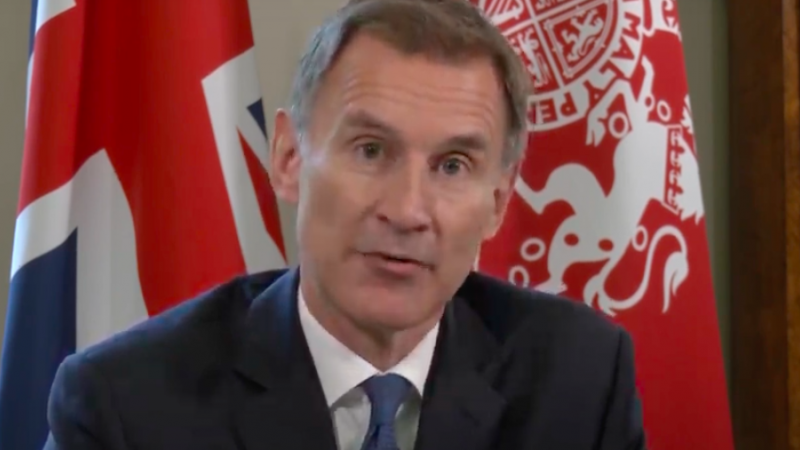Instead of addressing the real problems faced by people, Chancellor Jeremy Hunt’s budget has delivered the usual cocktail of austerity, low wages, higher taxes for the masses, and tax cuts for corporations and the rich.

Prem Sikka is an Emeritus Professor of Accounting at the University of Essex and the University of Sheffield, a Labour member of the House of Lords, and Contributing Editor at Left Foot Forward.
The UK economy is the only G7 economy whose gross domestic product (GDP) is smaller than before the pandemic. Economic recovery is hampered by low investment and demand as the average real wage of workers is lower than what it was in 2007.
Instead of addressing the real problems faced by people, Chancellor Jeremy Hunt’s budget has delivered the usual cocktail of austerity, low wages, higher taxes for the masses, and tax cuts for corporations and the rich.
The budget further depletes people’s spending power. Despite the inflation rate (RPI) of 13.4% the annual tax free personal allowance remains frozen at £12,570. There is no change to the thresholds for income tax and national insurance contributions (NIC). Consequently, despite negative real pay growth, millions of people will pay more in income tax and NIC. Someone earning £33,000 would pay an additional £500 in income tax. The government would collect extra £29.3bn. The effect of the stealth taxes is to swell the tax burden to 37.7% of GDP, a post-war high.
Tax cuts for the rich are disguised as tax relief on pension contributions. The current annual allowances will increase from £40,000 to £60,000. The Lifetime Allowance currently set at £1.07m is abolished altogether. The new policy will hand around £1.1bn a year to the richest. The government claims that the change will enable more people to remain at work. How? It offers nothing to 21m adults earning less than £12,570 a year or to 27.2m basic rate (20%) tax payers. The biggest winners will be 629,000 additional rate (45%) tax payers. Someone with a £2m pension pot will have received a tax cut of almost £250,000.
The average domestic energy bill has rocketed from £1,138 in April 2021 to £2,500 in March 2023 as energy companies’ profits have soared. The government’s Energy Price Guarantee, which restricted the average annual domestic bill to £2,500 is to be extended until the end of June. After that that bill may rise to £3,000. The Chancellor promoted the massive hike in energy bills as a government success story. Under the current arrangements, the government guarantees energy company profits by paying them the difference between £2,500 and the Ofgem tariff of £3,280. It then recovers a small part of the subsidy through a windfall tax on energy companies, but in the absence of curbs on profiteering, the public purse continues to be depleted.
From April the headline rate of corporate tax will rise from 19% to 25%. However, only 10% of companies will pay the full 25% rate. The “full expensing” policy will enable companies to write-off the entire cost of plant and machinery against their taxable profits in one-go rather than spread over a number of years. This will hand back around £9bn-£10bn a year to companies. The government’s claim that net lower corporation tax rate will somehow encourage private investment is simplistic. The corporation tax rate was 19% from 2016 to 2022, but that did not lead to higher investment.
During the EU years, the UK languished near the bottom of the EU investment league. It invested around 16.9% of its GDP in productive assets, a major cause of low productivity. In September 2022, it was 16.8 % of GDP. The Office for Budget Responsibility (OBR) attributes a 4% loss in productivity to Brexit, but the Chancellor was silent on that. Instead, the government will create 12 new investment zones to stimulate growth. Businesses operating inside them will receive £80m over five years in tax reliefs and grants. This can’t address deep-seated economic woes. The OBR said that the government has not provided enough information to enable it to “estimate the impacts that these investment zones might have”.
Between 2010 and 2019 around £540bn has been slashed from public services, and more after that. Since 2010 HMRC has failed to collect between £450bn and £1,500bn in taxes due to evasion, avoidance and fraud. Prosecutions of the enablers dreaming up tax abuse schemes have dropped by 80%. Only eight cases have been prosecuted in the past two years. The chancellor’s response is to slash HMRC budget from £5.9bn for 2022/23 to £5.6bn in 2023/24, and £4.6bn in 2024/25.
Despite the industrial unrest, there is no additional money to increase real wages of public sector workers. There is additional money for defence, but no additional cash to reduce the NHS waiting list, tackle crime or the housing crisis. The day-to-day departmental spending is expected to grow at 1% a year in real terms after 2024-25. The damage done since 2010 will not be restored.
The government is selling the fable of economic renaissance, but the budget does not provide the springboard for building a sustainable economy. The OBR assessment is that that the budget will cause GDP to shrink by 0.2% in 2023, and real disposable income per person is expected to fall by 5.7% over the next two years, the biggest fall in living standards since records began in the 1950s. The main purpose of any government is to increase people’s prosperity and happiness. With never-ending austerity and class wars as its policy, the government fails on both counts.
Left Foot Forward doesn't have the backing of big business or billionaires. We rely on the kind and generous support of ordinary people like you.
You can support hard-hitting journalism that holds the right to account, provides a forum for debate among progressives, and covers the stories the rest of the media ignore. Donate today.



